As William Jefferson Clinton came to power in January 1993, there was some reason to hope that the imperial presidency would be scaled back. Clinton, after all, was the first post-Cold War president and a member of a political party that had in the wake of the Vietnam War striven to restrain presidential aggrandizement in foreign policy.
Such hopes proved illusory. Throughout his administration, President Clinton has adopted a view of his executive power that is positively Nixonian in its breadth and audacity. The administration insists that the Comprehensive Test Ban Treaty still binds the United States under international law, even though the Senate explicitly declined to ratify that agreement. Administration officials likewise insist that the Anti-Ballistic Missile Treaty is still in effect even though one of the contractual parties (the Soviet Union) no longer exists. The administration has attempted to implement provisions of the Kyoto Protocol on the environment while continuing to refuse even to submit the treaty to the Senate for ratification. Those actions demonstrate that President Clinton has routinely abused the treaty power.
In addition to the abuse of the treaty power, the president has repeatedly usurped the congressional war power. In Haiti, Iraq, Sudan, and Bosnia, the Clinton administration displayed its contempt for the constitutional process and asserted a unilateral power to wage war without congressional approval. The most flagrant example was the 78-day air war conducted against Serbia in 1999 despite Congress’s adamant refusal to approve the action.
As we approach the end of President Clinton’s second term, the imperial presidency is as unconstrained and as menacing as it has been at any time since the Vietnam War. Bold congressional action is needed to reclaim legislative authority over the war power and the treaty power. Only then will America have an executive branch that comports with republican principles of government and the original constitutional design.


